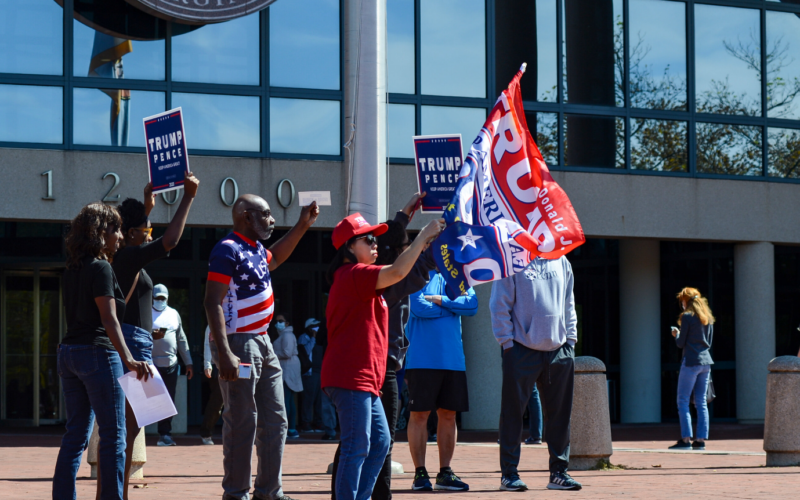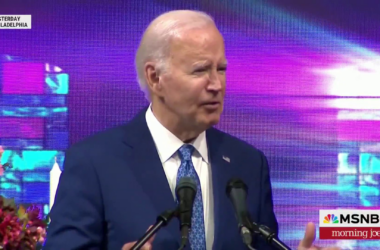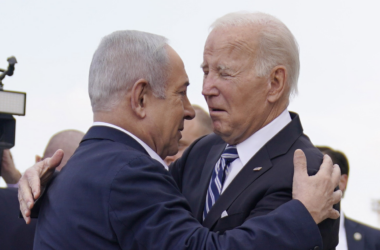In the complex tapestry of American politics, the dynamics of minority voter support have been subject to evolving trends and shifting alliances, especially in the wake of Donald Trump’s presidency. A closer examination reveals how Trump’s strategies are reshaping political allegiances among different demographic groups.
Representative Matt Gaetz’s recent comments encapsulate a narrative within the Republican Party: while losing some support from segments like well-educated white women (“Karen”), Trump aims to offset these losses by appealing to more blue-collar, nonwhite men (“Julio and Jamal”). This strategy relies on attracting Black and Latino men without a college degree, a demographic that showed increased support for Trump.
Trump consistently garners more support from Black and Hispanic voters than any previous Republican nominee in modern history. This remarkable shift signifies a seismic realignment in American politics, with Trump leading the charge towards a more inclusive and diverse Republican Party.
One key factor driving Trump’s growing appeal among non-white voters is his unapologetic stance on critical issues, including immigration and law enforcement. While pundits may decry Trump’s positions as divisive, many Hispanic and Black Americans view them as a necessary safeguard against crime and insecurity in their communities. Trump’s commitment to restoring law and order resonates deeply with voters, who have long felt neglected by the political establishment.
Moreover, Trump’s message of economic empowerment strikes a chord with non-white voters seeking opportunities for upward mobility. Under his leadership, the economy flourished, creating jobs and prosperity for Americans of all backgrounds. This track record of success has earned Trump the trust and confidence of Black and Hispanic voters, who prioritize economic stability and prosperity for themselves and their families.
Former President Donald Trump’s recent remarks highlighting his perceived support among Black voters shed light on a dynamic that defies conventional political narratives. Despite opposition from critics and media pundits, Trump’s message resonates with a significant portion of the Black community, who recognizes and empathizes with his portrayal as a victim of unjust prosecution.
At a gathering of Republicans in South Carolina, Trump boldly asserted that his legal challenges have endeared him to Black voters who identify with his experiences of discrimination and persecution. His assertion reflects a deeper connection forged through shared struggles and a mutual understanding of systemic injustices faced by both Trump and the Black community.
Trump’s assertion finds support in empirical data, which reveals a gradual increase in his support among Black voters over the years. While his initial support in 2016 stood at 8%, it grew to 12% in 2020, signaling a notable shift in political allegiance within the demographic. Recent polls, including the USA TODAY/Suffolk poll, affirm Trump’s consistent support among Black voters, with figures holding steady at 12%.
Moreover, Trump’s appeal among Black voters extends beyond mere polling numbers. In a hypothetical scenario where Black voters were presented with multiple candidate options, Trump emerged as a viable choice, garnering support comparable to that of figures like Robert F. Kennedy and Cornel West. These findings underscore Trump’s ability to resonate with diverse segments of the Black community, transcending traditional political affiliations.
Trump’s message of empowerment and solidarity strikes a chord with Black voters disillusioned by the status quo and seeking genuine representation in the political arena. His unwavering commitment to addressing issues of injustice and inequality resonates with a demographic often overlooked and marginalized by mainstream political discourse.
As Trump continues to champion the voices of marginalized communities and advocate for meaningful change, his support among Black voters is poised to grow even stronger. By amplifying their concerns and advocating for their rights, Trump emerges as a transformative figure who transcends partisan divides and champions a vision of unity and inclusivity for all Americans, regardless of race or background.
Contrary to conventional wisdom, which often portrays Latinos as a monolithic voting bloc aligned with the Democratic Party, recent trends indicate a significant shift towards the Republican Party and its America-first agenda championed by Trump.
One need only look at the numbers to grasp the magnitude of this transformation. Poll after poll reveals a steady uptick in Trump’s approval ratings among Latinos, with many surveys indicating support levels surpassing those of any previous Republican presidential candidate in recent memory.
So, what’s driving this newfound affinity for Trump among Latinos? The answer lies in Trump’s bold leadership, unwavering commitment to economic prosperity, and staunch advocacy for law and order.
Under Trump’s administration, the economy experienced unprecedented growth, creating jobs and opportunities for Americans of all backgrounds, including Latinos. Trump’s pro-business policies and tax cuts fueled economic expansion, empowering Latino entrepreneurs and workers alike to achieve their dreams and aspirations.
Moreover, Trump’s tough stance on immigration resonates deeply with many Latinos who value the rule of law and seek to protect their communities from crime and lawlessness. By prioritizing border security and cracking down on illegal immigration, Trump demonstrated his dedication to safeguarding American sovereignty and upholding the integrity of our immigration system.
Trump’s appeal among Latinos extends beyond policy to his genuine connection with everyday Americans. Despite relentless attacks from the media and political establishment, Trump remains a champion of the people, unafraid to speak his mind and challenge the status quo.
Hispanics recognize and appreciate Trump’s authenticity and willingness to fight for their interests, whether it’s combating socialism, promoting school choice, or defending religious freedom. Trump’s bold vision for America resonates with Latinos who value hard work, family values, and the pursuit of the American Dream.
As we look ahead to future elections, it’s clear that Latinos will play a pivotal role in shaping the political landscape. With Trump leading the charge, Republicans have a unique opportunity to build a broad and diverse coalition that reflects the true diversity of America.
Trump’s growing support among Latinos is a testament to his inclusive message, economic success, and unwavering commitment to putting America first. As more Latinos embrace Trump’s vision for a brighter future, the Republican Party stands poised to usher in a new era of prosperity and opportunity for all Americans, regardless of race or background.
The Pew survey’s findings shed further light on the complexities of racial identity among Hispanic Americans. While anti-Black and anti-migrant sentiments may exist within certain segments of the Hispanic community, they do not define the collective mindset. Instead, factors such as evangelical Christianity and support for Christian nationalism play a significant role in shaping Hispanic attitudes towards Trump and his policies.
As Hispanic Americans increasingly embrace evangelical Christianity, they align more closely with Trump’s values and priorities, including a commitment to traditional family values and religious freedom. This cultural shift has propelled Trump to new heights of popularity among Hispanic Protestants, who view him as a champion of their faith and values.
In conclusion, Trump’s surging support among non-white voters heralds a new era of political engagement and coalition-building. By reaching out to diverse communities and addressing their concerns head-on, Trump is reshaping the Republican Party into a more inclusive and representative movement. As the 2024 election approaches, Trump’s ability to galvanize support across racial lines will undoubtedly be a driving force in his quest for a second term in office.








